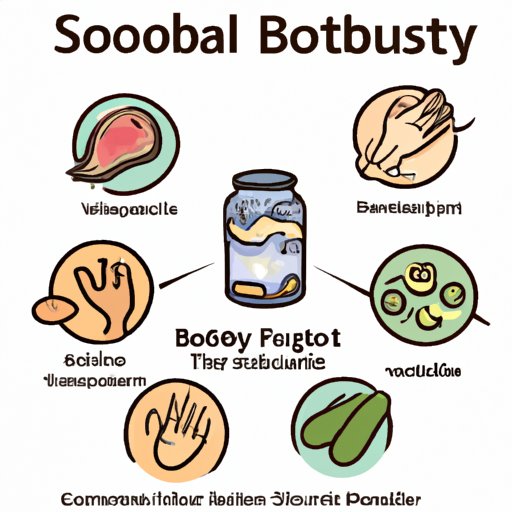
I. Introduction
Botulism is a rare but serious illness caused by a toxin produced by Clostridium botulinum bacteria. The toxin attacks the nervous system, leading to muscle weakness, difficulty breathing, and other severe symptoms. In this article, we will discuss various aspects of botulism to help you understand how it develops, how it affects the body, and how to prevent it.
II. Focusing on food safety
Since botulism is primarily spread through contaminated food, it is essential to maintain proper food safety to avoid the disease. Improperly canned food is a major source of botulism, as it can be contaminated with spores of the bacterium that are then activated and produce the toxin.
If you want to can your food at home, make sure to follow the guidelines provided by the US Department of Agriculture. Canning involves high-heat processing to destroy the bacteria and their spores. Always use tested recipes, check the seals on the jars, and store the canned food in a cool and dark place.
III. Discussing symptoms and treatment
Botulism can cause a range of symptoms, including double vision, slurred speech, difficulty swallowing, dry mouth, and muscle weakness. These symptoms can be gradual and can range in severity, depending on the amount of toxin that was ingested.
Seeking prompt medical care is essential for treating botulism. Treatment typically involves antitoxin medication and supportive care, such as ventilation support, in cases of severe muscle weakness. Antibiotics can also be used to prevent secondary infections.
IV. Examining the history of botulism
Botulism has been recognized as a disease for centuries. The bacterium was first identified in the late 19th century, and the toxin was isolated in the early 20th century. Over the years, there have been many notable cases of botulism, including outbreaks linked to canned food, honey, and wound infections.
Fortunately, advances in medical and food safety practices have helped to reduce the incidence of botulism in developed countries. Still, outbreaks can occur, and it is essential to monitor food safety and seek medical care if symptoms develop.
V. Investigating the causes of botulism
Botulism can develop in several ways, including ingesting contaminated food, inhaling the toxin, or getting the bacteria into an open wound. The bacteria are commonly found in soil and water, and they can grow and produce toxin if conditions are right, particularly if food is improperly processed or stored.
The risk of botulism can be reduced by following proper food safety practices, washing hands frequently, and avoiding consuming food from damaged or bulging cans. Infants under the age of one should not be given honey, which can contain dormant spores that can cause botulism.
VI. Delving into the science of botulism
The bacteria that causes botulism, Clostridium botulinum, is a spore-forming bacterium commonly found in soil and water. The bacteria produce a toxin that interferes with the nervous system, leading to paralysis and other symptoms.
The toxin is produced in anaerobic (oxygen-free) conditions, such as in improperly canned foods. The toxin can survive boiling temperatures, but it can be destroyed by high-pressure cooking or by adding acid to food.
VII. Conclusion
Botulism is a dangerous disease that can cause severe symptoms and lead to long-term complications. By following proper food safety practices, seeking prompt medical care, and avoiding risky behaviors, you can help prevent botulism and protect your health.
If you suspect that you may have been exposed to botulism, seek medical attention immediately. Symptoms can develop gradually and can be mistaken for other illnesses, so it is essential to be vigilant and seek care if you have any concerns.
Stay informed about food safety and take steps to protect yourself and your loved ones from botulism and other foodborne illnesses.




